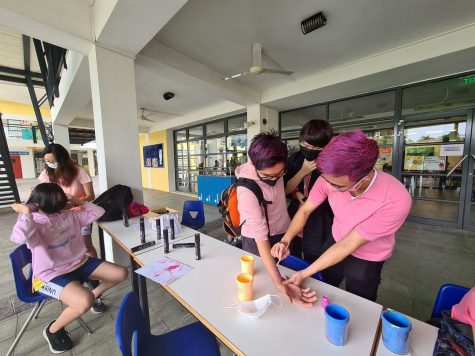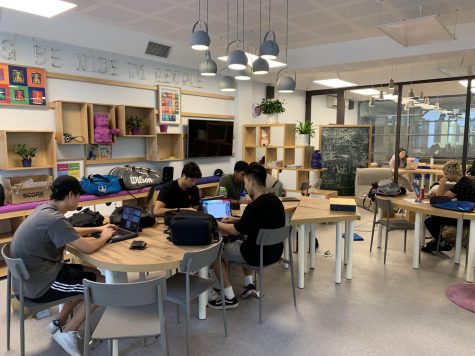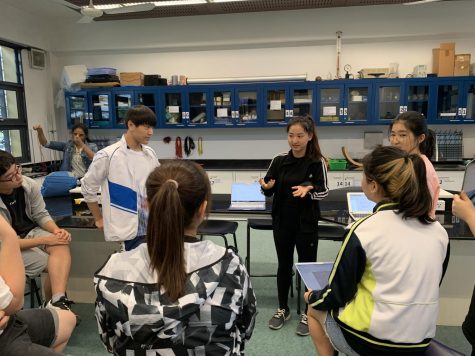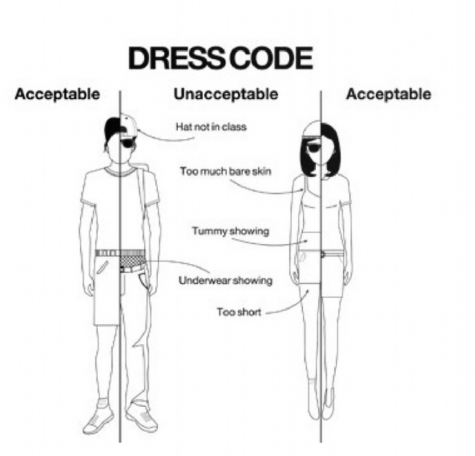The Representative Divide
Why do students choose to “keep quiet” about their issues? And if that’s the case, what will student representatives do about that?
On August 31, the results for the HS Senate 2017 student representatives came out, with high expectations for changes in the coming months. Now that it has been two weeks in, students are starting to wonder about the prospects of the elected officials… What are they up to now? Will they keep the promises that they’ve made in their election speeches? What does it mean to be a student representative?
As communication is key to the operations of the student representatives, I wondered if there have been any attempts of communication at all. I started by asking the student body what they know about the duties of their chosen representatives, and whether they directly communicated with the reps about some of their concerns.
Surprisingly, most of the students responded with confusion when asked about the job of a representative, and reflected with only negative feedback on the representatives’ performance from the previous years. One person put it succinctly: “I don’t know what they do, and I don’t see a lot of improvement.” Some students mentioned that many promises were made during representatives’ election speeches, but they have not seen any of these promises taking action.
The discussion I had with one of the students in Grade 11, Totti Andersen Ybarra, provides a good understanding of how the student body feels about their representatives.
Do you know what the student representatives do?
TY: No.
At all?
TY: Nope.
Okay, have you ever truly communicated with the student reps about any of your issues with the school?
TY: No, I don’t really speak publicly about any issues.
So you like everything about this school?
TY: No, I just don’t talk about it.
Why don’t you feel the need to talk about them? Or, why don’t you feel comfortable doing so?
TY: It’s not that I feel uncomfortable talking about my issues, it’s that most of my issues are minor, and even if I would have something bothering me, the reps won’t be able to solve it. I know that a lot of students share the same issues as me, but we all decide… I don’t know… to keep quiet.
But from your own point of view and the other students’, why do you decide to keep quiet?
TY: I guess our issues are so minor that we don’t really mind (not speaking about them). Plus bigger issues like IB being too difficult are not in the control of student reps. It is not like they can help with changing the curriculum.
Okay. What would you wish the student reps did?
TY: Reach out to the students, definitely. Instead of talking about all the things they’re going to do, they got to actually take action.
Don’t you think that the student reps are there for the students to reach out to and not the other way around?
TY: I think it should be mutual, because if the students are too shy to reach out to the reps, then they should take action. That wall between us isn’t going to be broken unless someone speaks up.
When interviewing other students in high school, the responses were similar; it seems as though the communication between the student representatives and the student body is significantly lacking. Most of the students never directly communicate with the representatives about their problems, and this is because they don’t know how or where to start. Some students, feeling quite let down by their representatives, decide not to verbalize their issues at all. Another student whom I interviewed, Marcelle-Marie Villars (Grade 11), also shared similar opinions as Totti:
Do you know what the student representatives do?
MV: I guess they, like, communicate to the senate what the grade wants?
Have you ever communicated with the student reps about any of your issues with the school?
MV: No.
Why haven’t you?
MV: I don’t know… I guess I’ve never felt that there was anything that bad to advocate for or something that needs to be changed. But also, I just don’t know whether it would really get done…
What do you wish the student reps did?
MV: Ask students what they want and go out of their way to communicate with us, not merely wait for the students to say something. I think our bond is not developed enough to have such expectations.
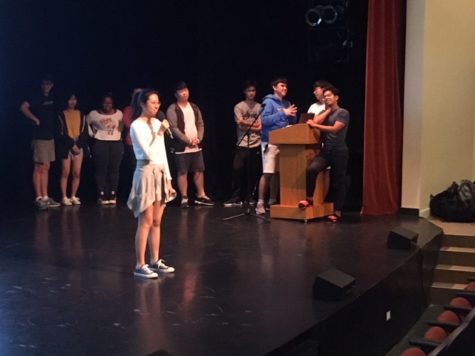
After interviewing the students who seemingly were not aware of what student representatives do and, perhaps, who might question the purpose of having student representatives, I have become curious whether the student representatives feel the same way as the students. Do they write their speeches solely for the reason of being selected as a Senate member (or maybe even for the purpose of forming a good high school resumé)?
The two student representatives I interviewed, Rohan Gowda and Shane Chung, provided enough information through their responses in order for me to form a general conclusion about the student representatives’ point of view.
What do you do as a student representative?
RG: Well, I am a new member of the student reps, so I’m not exactly sure. This year the Senate has three goals, and as a student rep, my personal goal is to connect with the student body and bring them closer to the Senate.
How are you going to connect with the student body?
RG: As a student rep, I’m going to listen to my grade, you know, then present issues that we have to the Senate. Also, present our own ideas, enhance our social media interaction with the student body, have school events, so that we can all, kind of, know each other better.
Is that going to be done through emails or some other method?
RG: During morning meetings, during Spirit Rallies. We are going to have more things like the Spirit Rally this year.
How do the Student Rallies play a role in the Communication Process between the student reps and the student body?
RG: Well, they let us all connect and be together, because, during school, we are doing our own things, like studying and all that. But during the Spirit Rallies, we get to come together and celebrate as a whole High School community.
Do you think that will resolve some of the personal issues the students have?
RG: That’s a different aspect. As a student rep, I will talk to my Grade, and get any of their possible suggestions and improvements to the school. I will take it in and present it to the Senate so that we can maybe, talk about it and plan to do it legitimately. So that all issues can be resolved in order to make the school a better place.
How are you going to let the students know that you are there available for help? How are you going to improve the general communication process between the students and the representatives?
RG: As I am a student rep, I plan to be approachable and accessible, and Shane and I are going to address our grade during the meetings soon, so that we can introduce ourselves and let them know who we are and that we are available for them to try and make the school better.
Rohan’s plans did not sound bad at all. In fact, he realizes the issue with the communication between the student body and student representatives. Yet, his plans still feel vague as of now. Last year, the chosen representatives have said very similar things to their electorate.
The second person I interviewed is Rohan’s co-representative, Shane Chung. He has been in the Senate for two consecutive years and spearheaded The Monday Matters program.
What do you do as a student representative?
SH: Well, my job as a student rep is to represent the community of the student body, which is like, representing their opinions and ideas to the admins in order to, hopefully, make them a reality.
As you have been a student representative for two years straight, what have you achieved?
SH: We (the Senate) are starting to work towards getting contributors. We have also worked towards collaborating with the student body to improve things like the dress code, “Monday Matters”, and things like that.
Over the two years of being a student representative, have students actually reached out to you about any of their issues?
SH: Yes they have. Through the Senate email, which we are planning to make a more casual thing.
But when students of your grade have any personal issues, how do they reach out to you about them? Also, would you mind sharing some of their issues?
SH: They mostly do it through the Senate email and some of the issues include the dress code, also they keep asking me to cancel “Monday Matters”.
What do you want to change at school in the future?
SH: We need to improve the communication, really badly; it’s been an issue for, maybe, two years now so we desperately need a change.
Could you elaborate on the student communication problem?
SH: So, people feel like there is a divide between the Senate and the student body. The Senate is this, like, “big-government-secret thing”, but I don’t want it to be that way. I want it to be completely transparent, because we are, after all, still a part of the student body. I think that improving the relations, having people come behind the scenes of what the student Senate does is more important than ever.
This being said, I realized that all the students holding the title of student representative are more than capable of helping students out with their troubles. Rather, the students’ decision to stay quiet come from the problems in the communication process itself. Many students do not feel comfortable talking to their student reps and since they have not been able to see the changes promised to become a reality, they do not feel confident in standing up to advocate for what they want. Moreover, if we take a look at the voting process of last year’s grade 11, very few people actually voted. This could be inferred that many of the students don’t care enough about who will represent their grade to take their time to vote. The student representatives, on the other hand, genuinely want to help, but are having trouble building a trusting connection between themselves and the student body. Both Rohan and Shane’s ideas sound promising, but we will have to wait and see whether their suggestions will come to life.
I (Sonya Koroleva G11, writer) have actually tried out to be a student representative but was unable to get the position. One of my personal goals as a student representative candidate was to improve the communication process between the representatives and the student body. Even though ultimately, I did not get elected, I still want to do my best to improve this issue. I feel that it is important to raise awareness about existing issues within the school, as overcoming the problems will bring the students closer together and help us develop a better sense of community.
As for the students, I encourage you to reach out to your student representatives. As Shane said, the Senate is still a part of the student body. If there are any issues you have or feel strongly about, your reps will try their best to advocate for them. The Senate has just developed two new communication platforms for us, the quarterly Townhall Meetings and the Senate “hub” website, so it would help them greatly if you speak up and share your opinions on how to improve our high school experience!

